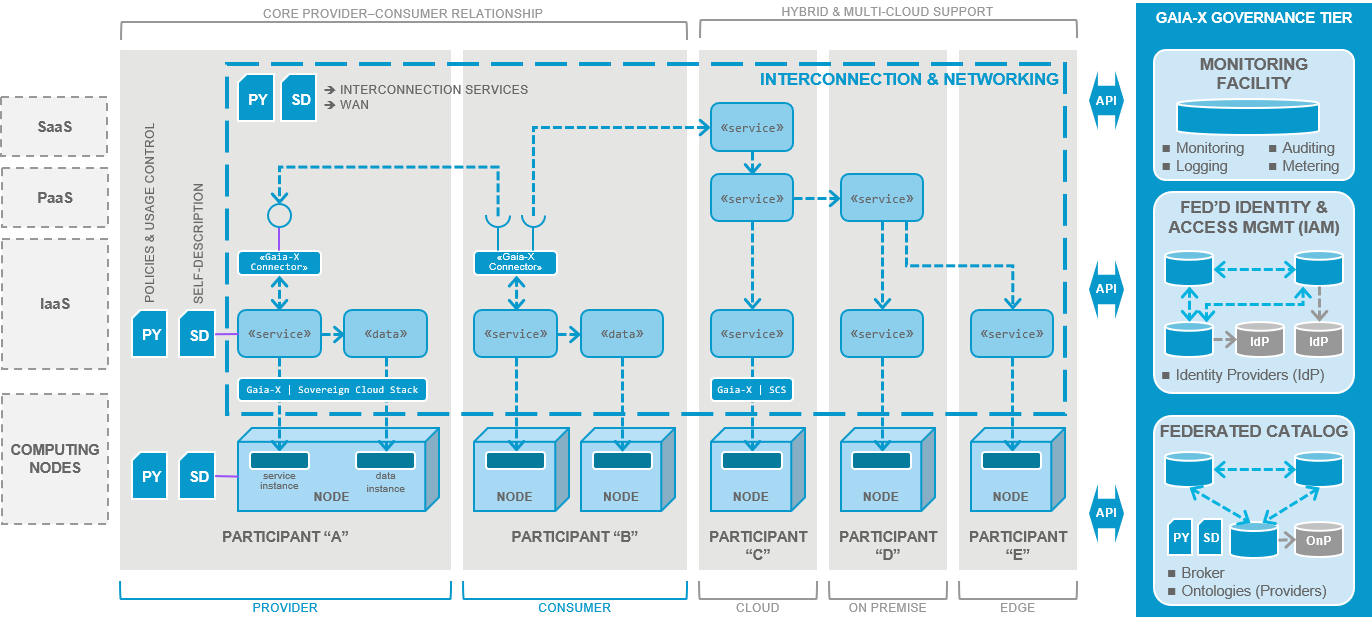Ecosystem driven economy
Gaia-X

Definition of Gaia-X
The currently predominantly German-Franco Gaia-X project defines and implements a federated data and open (source) software infrastructure as basis of a (European and beyond) digital ecosystem. Primary business drivers are
- Digital sovereignty (not technically defined yet)
- The ability to ensure European level data protection if and when needed for the users
- Openness, & transparency
- Interoperability in a federated architecture (also not technically defined yet)
Methodologically, Gaia-X is a technical and organizational standard for a virtualization layer realizing a (self-sovereign) hybrid multi-cloud data, service, and application mesh. Here, hybrid refers to the possibility to mix cloud computing with on-premise or edge computing. This will include
- An open source reference implementation (the «Sovereign Cloud Stack») for components to run and participate in Gaia-X, and
- Organizational procedures (e.g., for accreditation, certification, conformance checking)
The project was initiated in September 2019 by the German Minister of Economy, Peter Altmaier, with its official launch at the “Digital Summit” October 29, 2019. First results (e.g., a demonstration of a “minimum viable Gaia-X product”) are expected for Q1 2021.
An international not-for-profit association according to Belgian law, the Gaia-X Foundation AIBSL, is currently being officially founded in Brussels to oversee standardization, implementation, and conformance checking for all standards and procedures. The Gaia-X Foundation initially comprises 22 French and German organizations but is open to any interested party subscribing to the values of the project and paying membership fees between 5 k€ (< 10 M€) and 75 k€ (> 10 B€) per year depending on revenues.
The following (unofficial) diagram depicts the high-level technical architecture of Gaia-X consisting of a data and service mesh of different providers and consumers. The vertical ‘Gaia-X Governance Tier’ comprises (logically) central functions like a catalog, identity and access management, and monitoring, all of which are provided in a federated fashion.

The project team has released a Technical Architecture document in June 2020 which contains a lot of details but somewhat fails in drawing a coherent and consistent picture of what Gaia-X is really about from a technical point of view.
Technology Evaluation
The vision and direction of Gaia-X clearly goes beyond what is available to-date (e.g., International Data Spaces – Reference Architecture Model) in its breadth and comprehensiveness (native multi-cloud, edge, federation). This is an extremely ambitious project with a very large and diverse project team (200+ people) without any direct funding (yet). A core idea behind Gaia-X is to create a digital ecosystem completely independent from the hyperscalers. It is uncertain how that may be really achieved without setting up a physical IaaS infrastructure (which is out-of-scope of Gaia-X). Many concepts (federation, self-sovereignty) and standards (identity and access management, service and data catalog, self-description) are not yet precisely defined from a technical or functional point of view even after one year into the project.
Market - Current Adoption
Given that this is an official German light-house project, Software AG as the 2nd-largest German company has been represented actively in the project thru Christoph F. Strnadl of the CTO OFFICE since September 2019. German presales also contribute to the project.
Outside of our contribution, Gaia-X has garnered significant support:
- 100+ companies are contributing in various degrees to the project
- 22 companies have put an estimated 1.5 M€ seed money into Gaia-X Foundation, an additional 45+ candidates from 6 EU member states are interested to join it
- Highest official government support in Germany & France (relevant ministers)
- Technically, current adoption is zero because nothing is available yet (with the exception of a subset of components of the Sovereign Cloud Stack). The project team is working on a “demonstrator” showcasing a “minimum viable Gaia-X” expected by 1Q'21
Despite this line up, the project, especially in 2019 when it was announced, has met almost unison negative feedback and critique. There are only few people and organizations publicly defending the project (except German and French politicians).
Market - Outlook
Overall reception in the public (including press) has been very negative (especially in the beginning) due to many large-scale IT project failures in Germany.
Depending on the technical maturity of the deliverables and the efforts required to actively participate, the vision of Gaia-X may be very attractive to Europe’s fragmented service and data provider and consumer markets.
